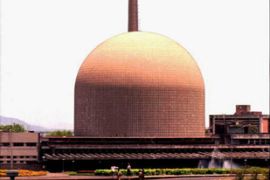India and US finalise nuclear deal
India is not required to sign up to the nuclear nonproliferation treaty.

Both sides said the deal, the 123 Agreement, offered them strategic and economic benefits, including enhanced energy security, a more environmentally friendly energy source, greater economic opportunities and more robust nonproliferation efforts.
The pact makes no reference to testing, but asserts each country’s right to request the return of transferred items, such as fuel.
Shiv Shankar Menon, India’s foreign secretary, said. “This agreement has a finalised text which meets the concerns of both sides and serves the interest of both sides. There are no conditionalities.”
New Delhi has denied that it will expand its nuclear weapons programme; but many US politicians and nonproliferation experts are concerned about what they believe are concessions to the Indian nuclear establishment that undermine US nonproliferation goals.
‘At odds with US law’
Congressional sources said the deal could be at odds with the US law that requires Washington to halt nuclear co-operation if India tests a weapon as it did in 1998. Experts expect more tests.
But Nicholas Burns, US under-secretary of state for south Asia, said this was “hypothetical”. He said the deal would “liberate our two countries for a new engagement”.
George Bush, the US president, agreed to reprocessing by India despite saying in 2004 that “enrichment and reprocessing are not necessary for nations seeking to harness nuclear energy for peaceful purposes”.
Previously, the US has granted reprocessing rights only to Japan and the EU, both US allies.
To some critics, the Bush administration’s willingness to let India reprocess US-origin nuclear fuel raises a question of inconsistency in its dealings with Iran.
Unlike India, Iran is a member of the nuclear nonproliferation treaty, and yet Washington has led a UN effort to force the country to abandon its enrichment programme.